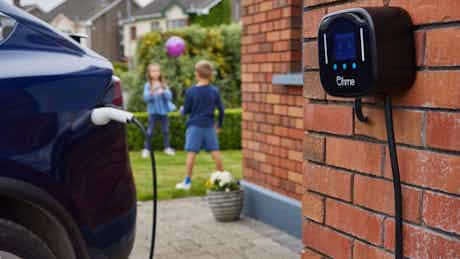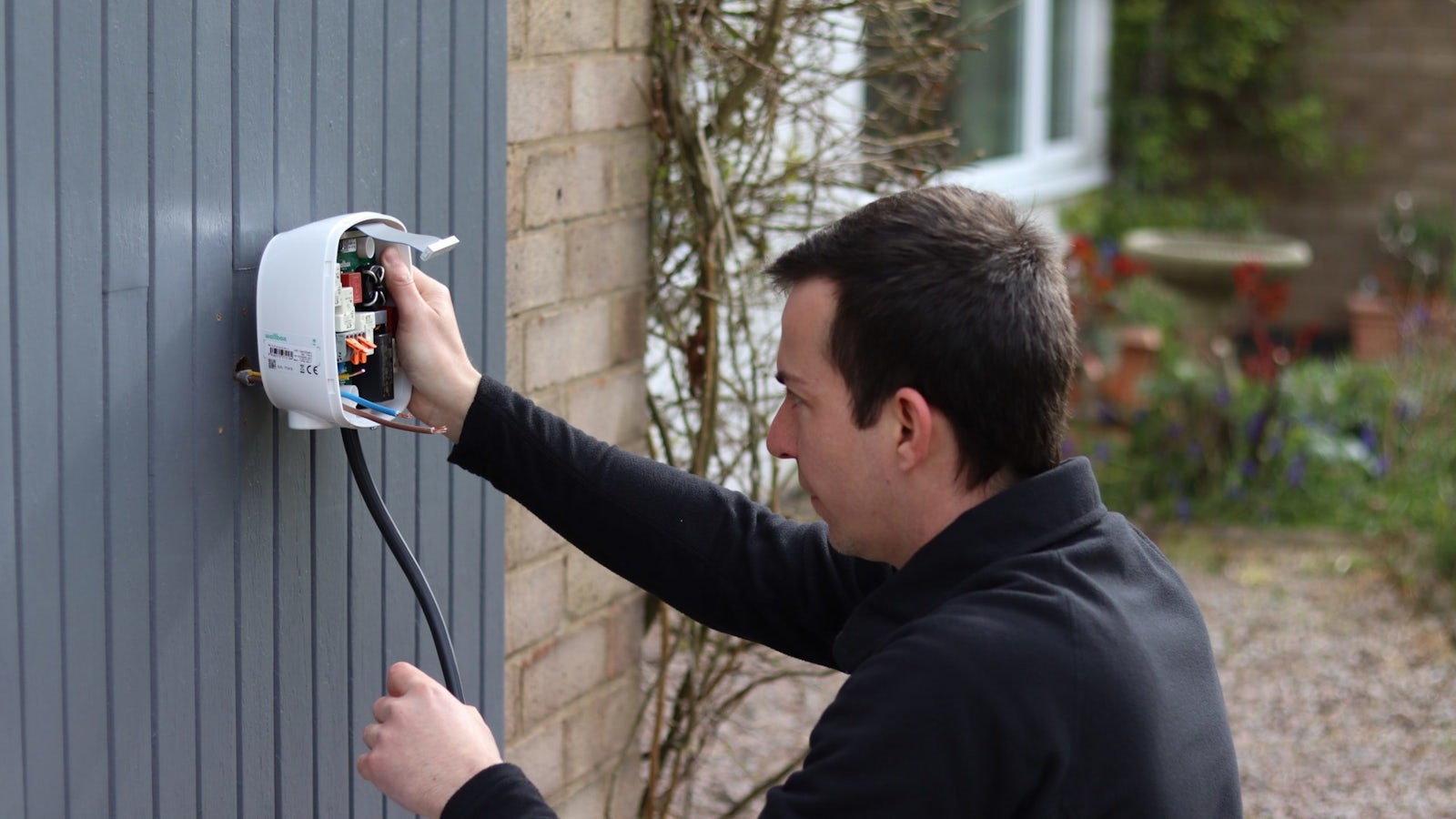Electric car charger installation costs in 2026
July 18, 2025 by Carwow staff

Got off-street parking and thinking about an EV? A home charger’s pretty much a must-have – here’s what to know about electric car charger installation cost and how it all works.
For those lucky enough to have a driveway, garage or other form of off-street parking, getting a home charger – sometimes called a wallbox – installed should be one of the first things you investigate as you begin looking at making the switch to electric motoring, even before you check out how much you can save on your new electric car through Carwow.
The government previously offered grants of up to £350 to help homeowners cover the cost of installing a home EV charger. However, this grant ended in March 2022. Now, only landlords or people living in flats are eligible to apply for the grant – homeowners can no longer receive this funding.
That means understanding the prices involved in getting a wallbox installed has never been more important, and this guide breaks down some of the costs you can expect to encounter.
Remember, you can buy a brand new or used car right here on Carwow. And you can also sell your car, too. We’re here to help you through every step of your car-changing journey.
Cost of installing an electric car charger at home
Expect to pay around £500-£1,000 for installing a standard 7kW home fast charger, with the charger unit itself costing a similar amount. Many companies bundle installation with the charger price for convenience. For example, the Rolec WallPod:EV HomeSmart costs about £913 for the unit alone or £1,249 fully installed (as of mid-2025), assuming a straightforward installation – no extra cabling or drilling through thick walls.
Do be warned, though, that given how different individual houses can be (see next section), you really are best off getting a quote.
Faster 22kW chargers are available but need three-phase power, which most UK homes lack. Upgrading your power supply can be expensive, typically £3,000 to over £15,000, depending on your location and grid conditions.
Home chargers now come with Wi-Fi and smartphone apps as standard, and prices have fallen. Basic units start at around £600, while models with LCD screens or solar integration cost between £900 and £1,100. Government grants are limited but still available for some users until 2026.

What affects the cost of installing an electric car charger?
- Where your internal electricity distribution board is. If the desired location for the chargepoint is a long way from this, the extra wiring and/or drilling through multiple internal walls will push up costs.
- Your home’s construction. If, for example, you live in an old house with three-foot-thick exterior stone walls, the time, care and effort these will take to drill through will affect installation costs.
- Your house’s electrical system. Homes that haven’t had their electrics updated in a fair few years may require additional work before the system can handle the high demands placed on it by a charger.
- The charger being installed. Some chargepoints are harder to install than others, taking more time and effort.
- Any additional options. Perhaps you want a floodlight installed at the same time as the charger; clearly this will increase the cost.
It’s often best getting the company you are buying the charger from to install it as they will have technicians on-hand who are familiar with the specific unit in question; it’s certainly worth getting a quote or two from an independent installer, though.
Are there any government grants?
The government grant for individual homeowners has now ended. While the original Electric Vehicle Homecharge Scheme (EVHS) supported homeowners by covering 75% of the cost (up to £350) for installing home chargers, this scheme closed in March 2022.
Since 1 April 2022, the replacement EV Chargepoint Grant continues to offer up to 75% funding (maximum £350), but it’s specifically designed to help tenants, flat owners, and landlords with off-street parking – rather than individual homeowners.
This shift reflects a focus on improving charging access for those who previously faced barriers, such as renters and residents of flats, rather than those who own their homes. Note that the grant can’t be claimed if you’ve already used the EVHS or if you’re upgrading or relocating an existing charger.

How is an electric car charger installed?
An electric car charger is installed on an exterior wall, and will be close to where you park, and ideally close to the point where your home’s main electrical feed enters the property.
The installation process starts with a home survey to assess your particular setup, and this is usually a no-cost service. The charger company will also tell you if any upgrades are required to your home electricity supply; if they are, this must be done before the charger can be installed, and it is often necessary to involved the electricity infrastructure company for upgrades, adding time to the process.

The next step is to have the charger installed in a suitable location, connecting the wiring to your fuse box and installing an isolator switch. The system is then tested to ensure that all is working as it should.
Most wallbox companies offer an installation service, and it’s best to let them take care of it; this way you have one point of contact in case anything goes wrong. The installation charge includes all the wiring and cabling that is required for the job, and it should take around 2-3 hours for most installs.
What do you need to install an electric car charger?
You need to have a few things in place before you can have a home charger installed:
- Off-street parking: Charge point firms will not install points if you do not have this.
- Wi-Fi access for the chargepoint, plus a smartphone to control the charger.
- Suitable home electricity supply: This can be upgraded prior to installation, though it will cost extra.
- Parking spot should be within a certain distance of the electricity meter, though you can pay extra for longer, more complex installations.
- Permission from the landlord if you rent the property.
How much does it cost to charge an electric car at home?
The size of an electric car’s battery is measured in kilowatt-hours (kWh), and electricity costs are charged per kWh based on your energy supplier’s tariff.
To estimate the cost of charging an EV from 0% to 100%, multiply the battery capacity (in kWh) by your electricity rate. For example, a 100kWh battery will use roughly 100kWh of electricity when fully charged. At 30p per kWh, that’s about £30 to recharge. Similarly, an 80kWh battery, like in the Skoda Enyaq, would cost around £24 at the same rate.
In practice, it’s not quite this simple. Most drivers don’t let their battery drop to 0%, and manufacturers recommend charging only up to 80% regularly to protect battery health and longevity.
You can also look at efficiency in terms of miles per kWh – most EVs display this in the dashboard or app. A car achieving 4 miles per kWh is more efficient than one at 2.5 miles per kWh. Using the 30p/kWh rate as an example, driving a car that gets 4 miles/kWh costs about 7.5p per mile in electricity, while a 2.5 miles/kWh vehicle costs 12p per mile.
Many EV owners now benefit from special EV-friendly electricity tariffs with cheaper off-peak rates, often overnight. If your home charger is smart and you schedule charging to these times using the car’s app or charger controls, your real-world charging costs can be significantly lower than standard tariffs.
Check out our full guide on how much it costs to charge an electric car for more information.
Is it worth getting an electric car charger installed?
Absolutely. Charging your EV at home is much cheaper than relying on public chargepoints, which typically cost around 75p per kWh, while off-peak home electricity rates can be as low as 9–10p per kWh. For example, charging a 50kWh battery from empty could cost roughly £32.50 at a public charger vs. about £4.75 at home.
Also, standard three-pin plugs only provide about 2.3kW, meaning a large battery (say, 100kWh) could take over 40 hours to fully charge this way. A dedicated 7kW home charger reduces that to around 14 hours, making it a far more practical solution. Importantly, three-pin plugs are not designed for sustained EV charging and should only be used in emergencies.
On top of convenience and cost savings, some EV owners now rent out their home chargers when not in use via platforms such as JustPark or Pod Point’s sharing schemes, helping offset costs.
Car Change? Carwow!
Looking for a new set of wheels? With Carwow you can sell your car quickly and for a fair price – as well as find great offers on your next one. Whether you’re looking to buy a car brand new, are after something used or you want to explore car leasing options, Carwow is your one stop shop for new car deals.















